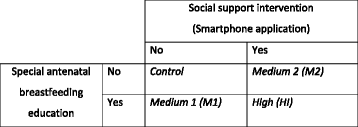A study to prolong breastfeeding duration: design and rationale of the Parent Infant Feeding Initiative (PIFI) randomised controlled trial
- PMID: 26231519
- PMCID: PMC4522088
- DOI: 10.1186/s12884-015-0601-5
A study to prolong breastfeeding duration: design and rationale of the Parent Infant Feeding Initiative (PIFI) randomised controlled trial
Abstract
Background: Very few Australian infants are exclusively breastfed to 6 months as recommended by the World Health Organization. There is strong empirical evidence that fathers have a major impact on their partner's decision to breastfeed and continuation of breastfeeding. Fathers want to participate in the breastfeeding decision making process and to know how they can support their partner to achieve their breastfeeding goals. The aim of the Parent Infant Feeding Initiative (PIFI) is to evaluate the effect on duration of any and exclusive breastfeeding of three breastfeeding promotion interventions of differing intensity and duration, targeted at couples but channelled through the male partner. The study will also undertake a cost-effectiveness evaluation of the interventions.
Methods/design: The PIFI study is a factorial randomised controlled trial. Participants will be mothers and their male partners attending antenatal classes at selected public and private hospitals with maternity departments in Perth, Western Australia. Fathers will be randomly allocated to either the usual care control group (CG), one of two medium intensity (MI1 and MI2) interventions, or a high intensity (HI) intervention. MI1 will include a specialised antenatal breastfeeding education session for fathers with supporting print materials. MI2 will involve the delivery of an antenatal and postnatal social support intervention delivered via a smartphone application and HI will include both the specialised antenatal class and the social support intervention. Outcome data will be collected from couples at baseline and at six and 26 weeks postnatally. A total of 1600 couples will be recruited. This takes into account a 25% attrition rate, and will detect at least a 10% difference in the proportion of mothers breastfeeding between any two of the groups at 26 weeks at 80% power and 5% level of significance, using a Log-rank survival test. Multivariable survival and logistic regression analyses will be used to assess the effect of the treatment groups on the outcomes after adjusting for covariates.
Discussion: The PIFI study will be the first Australian study to provide Level II evidence of the impact on breastfeeding duration of a comprehensive, multi-level, male-partner-focused breastfeeding intervention. Unique features of the intervention include its large sample size, delivery of two of the interventions by mobile device technology, a rigorous assessment of intervention fidelity and a cost-effectiveness evaluation.
Trial registration: Australian New Zealand Clinical Trials Registry ACTRN12614000605695. Registered 6 June 2014.
References
-
- Horta B, Victora C. Long-term effects of breastfeeding: a systematic review. Geneva: World Health Organization; 2013.
Publication types
MeSH terms
Associated data
LinkOut - more resources
Full Text Sources
Other Literature Sources
Medical


